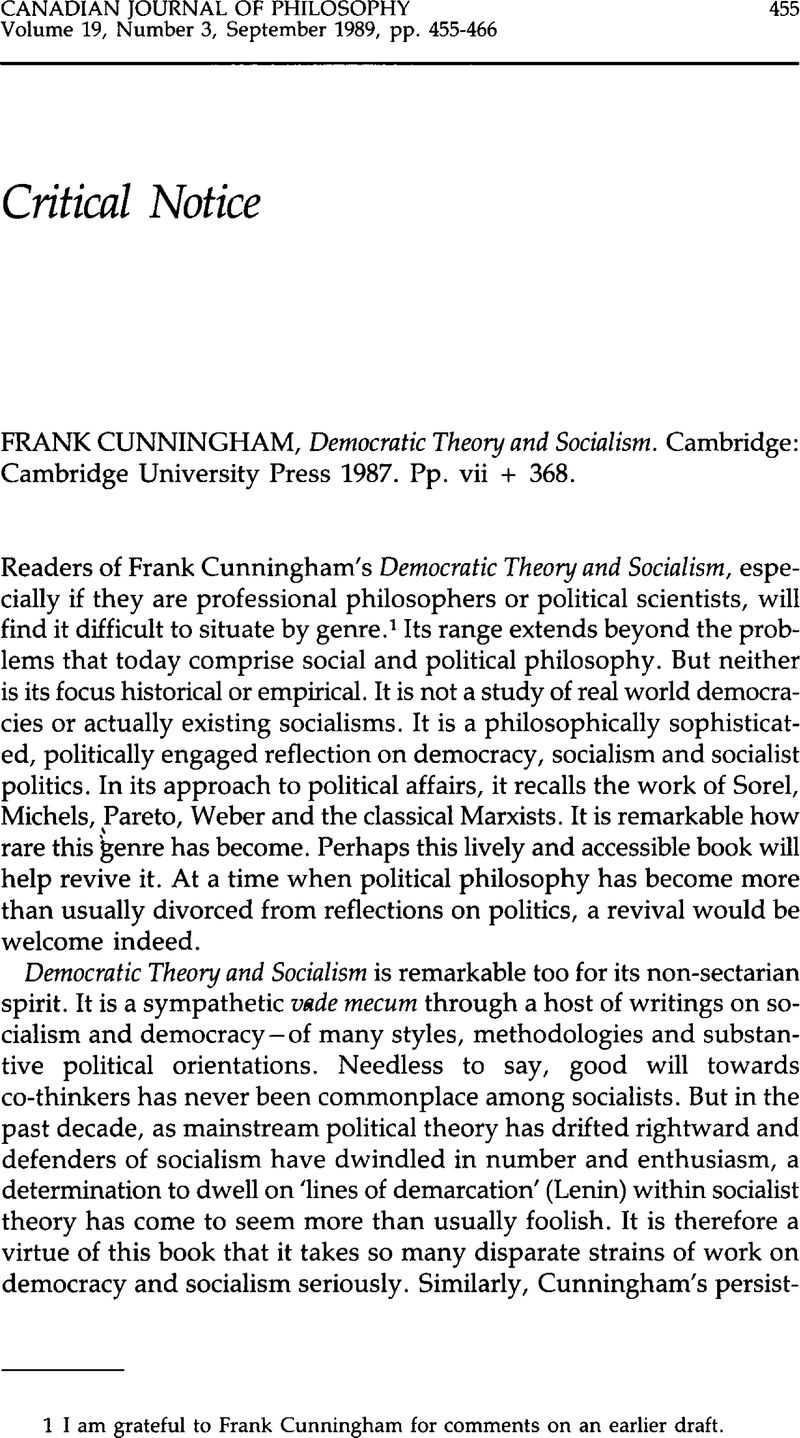No CrossRef data available.
Published online by Cambridge University Press: 01 January 2020

1 I am grateful to Frank Cunningham for comments on an earlier draft.
2 See Macpherson, C.B. The Political Theory of Possessive Individualism: Hobbes to Locke (Oxford: Oxford University Press 1962)Google Scholar, The Real World of Democracy (Oxford: Clarendon Press 1966)Google Scholar, Democratic Theory: Essays in Retrieval (Oxford: Clarendon Press 1973)Google Scholar, The Life and Times of Liberal Democracy (Oxford: Oxford University Press 1977)Google Scholar.
3 See ‘The Maximization of Democracy’ (Democratic Theory: Essays in Retrieval, 3).
4 For a fuller discussion of Macpherson’s affinities with Marxism, and of some implications of his reluctance to endorse Marxian positions directly, see my Liberal Democracy: A Critique of Its Theory (New York: Columbia University Press 1981), chapter 10.
5 See ‘Berlin’s Division of Liberty,’ in Democratic Theory: Essays in Retrieval; and my Liberal Democracy, chapter 10.
6 To be sure, Cunningham is critical of liberal democratic implementations of these institutional arrangements. But it is worth noting that in two long chapters devoted to the question of retrieval, only two and a half pages (164-7) are spent on ‘liberal democratic limitations.’
7 Cf.de Tocqueville, Alexis The Old Regime and the French Revolution, trans. Gilbert, Stuart (New York: Doubleday 1955)Google Scholar.
8 Macpherson’s opposition to revolutionary change has little to do with fondness for the regime in place. Nor does it have much to do with conservative hesitations about radical change. Writers from Burke to Hegel to contemporary mainstream theoreticians have maintained that there is an intimate-even necessary-connection between Revolution and Terror, and have warned against the dire, unintended consequences of revolutionary upheavals. Whatever we make of their arguments, their strictures do not appear to have carried much weight with Macpherson. Even in his book on Burke, this strain of anti-revolutionary argument passes unmentioned. See Macpherson, C.B. Burke (Oxford: Oxford University Press 1980)Google Scholar.
I would suggest that Macpherson’s reformism is more immediately political; that it follows from a negative view of official communism-conceived, in Cold War fashion, as the main contemporary representative of revolutionary socialism— and a faith in liberal democracy as its historical antagonist. For corroboration of this suggestion, see, especially, the concluding paragraphs of ‘The Maximization of Democracy.’ For elaboration of this reading of Macpherson and some reflections on its implications for his political philosophy, see my Liberal Democracy: A Critique of Its Theory, Chapter 10.
9 Cf. my The End of the State (London: Verso 1987), Chapter 4.
10 A prime example upon which much attention is lavished in Democratic Theory and Socialism is Ernesto Laclau’s and Chantal Mouffe’s hegemony and Socialist Strategy: Towards a Radical Democratic Politics, trans. Winston Moore and Paul Cammack (London: Verso 1984).
11 Cf. my Arguing for Socialism: Theoretical Considerations.
12 Cf. my The End of the State, chapters 6 and 7.
13 See my The End of the State.